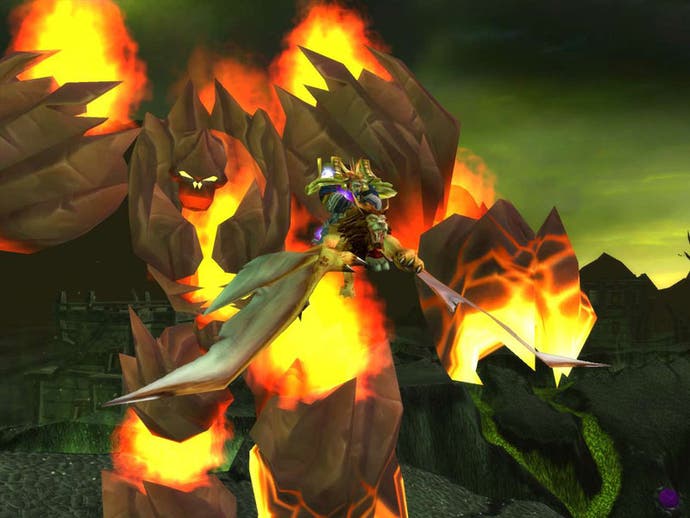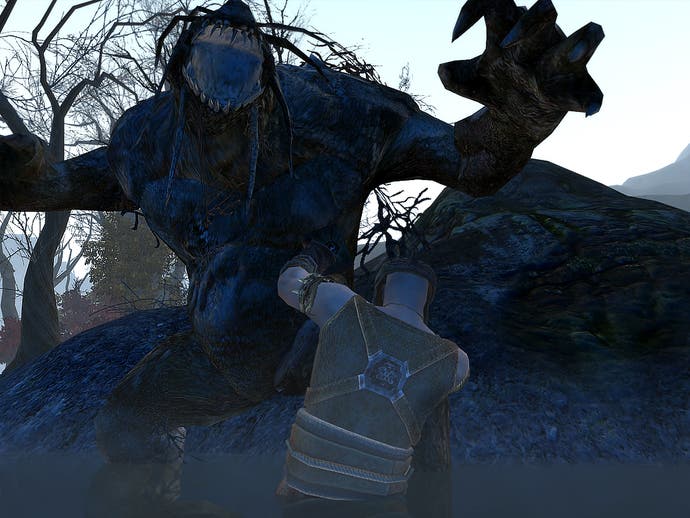Where are all the console MMOs?
Isn't now the time? We ask MMO developers.
Rez pls
In the future. In the future. So why not now? Ankama Games, creator of cartoon-inspired online game Dofus, goes against his contemporaries and raises the question of whether current televisions are suitable to display MMOs. On the surface of it, the jump in resolutions from 768x576 (PAL) up as high as 1920x1080 (1080i/p) gives it the feel of a hurdle we've already cleared, but - rather like the belief that online gaming was already well-established in 2001 - the belief that these televisions are in enough homes, or even that enough consumers are using the right cables to get at those resolutions, are perhaps wayward. Ankama's Anthony Roux emphasises why high resolutions must propagate: "What needs to be improved to see more successful MMOs on consoles is the way that players can interact and communicate," he says. "If every console could be shipped with a keyboard, and it became a widespread [console] instrument, it would probably help."
And that doesn't mean simply offering USB keyboard support, as the PS3 and Xbox 360 do, and as Wii is rumoured to be on the verge of doing. Microsoft has a USB text-input device (a sort of keyboard sandwiched between buttons - not unlike Nintendo's GameCube Phantasy Star Online equivalent) on the way, but like the TV issue, the enthusiasm all seems to bleed from a wounded assumption that because these things exist, and consoles work with them, people have them.
Inevitably then, the big players are missing. EA has no console MMO, despite having recently acquired Mythic Entertainment for its Warhammer Online game. Ubisoft is absent, although Tom Clancy's EndWar is promising a persistent online multiplayer campaign in the manner of that described by Hassinger earlier - and the publisher will likely pick up The Crossing from Arkane Studios at some point. But there's no hint of activity from specialist massively-multiplayer-online company NCsoft. Or, perhaps most tellingly, no sign of Blizzard and World of Warcraft.
Levelling up

Of course, everyone we speak to loves World of Warcraft's impact. Attention focused on MMORPGs in the PC market when Richard Garriott's Ultima Online arrived back in 1997 (it shifted 50,000 copies in year one, and peaked at 250,000), while EverQuest expanded on that (200,000 in 1999, 550,000 at its peak), but WOW is the game that really made it. "I think we just have to take our hats off and give credit to them," says Funcom's Ellingsen. "The genre had been steadily building itself up through recent years, but when that game entered the market, it just exploded. World of Warcraft opened the genre to millions of new players, and hopefully other developers will cash in on that success."
So it's not surprising, when searching for an explanation for the console MMO vacuum, that Blizzard's seems to make the most sense. Itzik Ben Bassat, vice president of international business development, sings the same song to a different tune than that of the Funcoms, Square-Enixes and Zuxxezes. "Online console gaming is still in its very early stages, and it needs to be developed further to provide opportunities of a scale which will be interesting to us," he says. Paul Sams, COO of Blizzard, was more direct in his comments to GamesIndustry.biz last year: "When you look at Battle.net," he said, "and you look at the subscribers we have with World of Warcraft, even Xbox Live is not even close to us."

Really, unsurprisingly, that's what it's all about: money. "The development time for a big MMO is multiple years, and the teams are very large, so you are investing tens of millions of dollars prior to launch. The risk is exceptionally high," says Richard Garriott, whose current project, Tabula Rasa, NCsoft is publishing on PC. Funcom's Ellingsen agrees. "These are huge projects, so for developers, taking chances and deviating from that formula can be a gigantic risk." Square Enix's Tanaka says consoles are still in "transition". He doesn't expect console MMOs until the installed bases for each console are vast. That's vast by PC MMO standards, and that means a significant percentage take-up of online services for each, because - as we all know - Xbox Live and PlayStation Network aren't going to want to talk to one another.
And while Xbox Live in particular is heralded for its contribution to the Xbox business' ascension, and its newfound cross-platform compatibility with PC is considered a massive boon for some PC developers, it and services of its ilk are ultimately the final nail in the console MMO's presently unopenable coffin: MMOs need to charge subscription fees to exist, but console gamers already pay fees for Xbox Live; they don't for PlayStation Network, but developers on both formats pay their dues to the platform holders. Couple that with relatively tiny audiences, the inability to freely patch software without going through restrictive quality-assurance bottlenecks, and a lack of free-and-easy inter-compatibility, and it's not hard to see why MMO developers are happy to talk up prospects but unhappy to lay down capital.

It might sound chicken-and-egg, but really it's green-and-green. Developers and publisher won't bother until they can guarantee a certain level of return in their own minds, and these elements conspire to cast doubt over that. "As sales numbers for the consoles begin to increase, it is safe to say that many game companies will naturally begin to target the MMORPG user," Tanaka concludes. "I wouldn't be surprised if in the near future, announcements regarding console-based MMORPGs became just as common as those for PC-based ones."
Nor would we. But with so much left to change first, we might scratch the word "near" for the time being.
